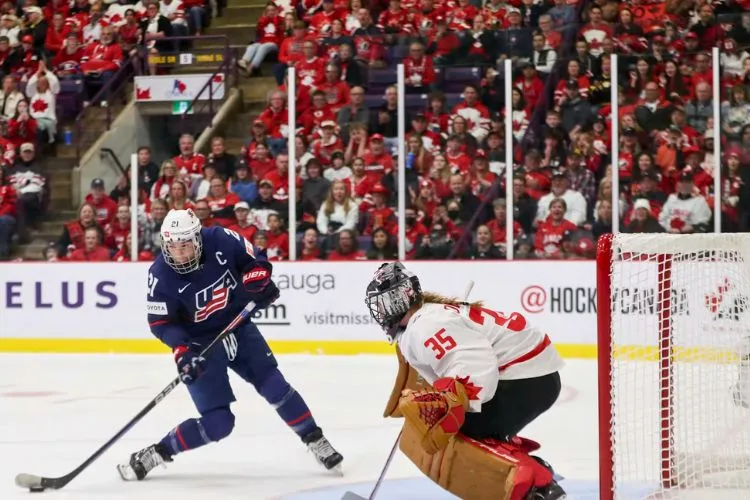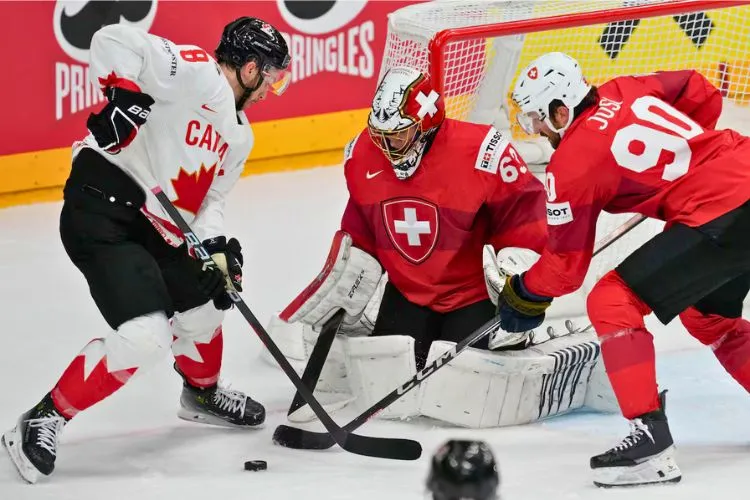Ice hockey is a dynamic and exhilarating sport enjoyed by millions around the globe. It combines speed, skill, and strategy in a way that captures the attention of spectators and players alike.
One common question that arises among fans, particularly those new to the sport, how long does an ice hockey game last?
Understanding how long an ice hockey game lasts helps fans manage their time, especially when planning to watch a game live or on television.

How Long Does an Ice Hockey Game Last?
A standard ice hockey game comprises three periods, each lasting 20 minutes, making the total regular game time 60 minutes. However, this duration refers only to the clock time.
The actual time taken to complete an ice hockey game is longer due to the clock stopping for various reasons, such as penalties, puck out of play, goals, and injuries.
The Role of Intermissions
Intermissions play a significant role in the overall duration of an ice hockey game. Typically, there are two intermissions, one after the first period and the other after the second period.
Each intermission lasts about 15-17 minutes and serves several purposes. These breaks allow the ice to be resurfaced, which is necessary for maintaining good playing conditions.
Intermissions also provide players and coaches the opportunity to rest, strategize, and discuss the game’s progress.
Stoppage Time
Stoppage time significantly affects the real-time duration of an ice hockey game. The game clock pauses for a variety of reasons, including penalties, when the puck goes out of play, after a goal is scored, and when players are injured.
These stoppages mean that, although the official game time is 60 minutes, the elapsed time is longer, usually extending the total duration to approximately 2.5 to 3 hours.
Overtime and Tiebreakers
When a game ends in a tie during the regular season, overtime is used to determine the winner. Overtime typically lasts 5 minutes and is played with fewer players on the ice for each team.
If the game remains tied after overtime, a shootout determines the winner. The shootout involves players taking turns attempting to score against the opposing team’s goaltender.

Playoff Overtime Rules
The rules for overtime differ in the playoffs. Instead of a brief overtime period, playoff games feature continuous 20-minute overtime periods until a goal is scored, with no shootout.
This can significantly prolong the duration of playoff games, sometimes extending them by hours.
Factors Affecting Game Length
Several factors can influence the total duration of an ice hockey game. The frequency of penalties and the number of goals scored are among the most significant.
Games with many penalties or goals will have more stoppages, extending their duration. Additionally, the specific rules of the league hosting the game can also affect its length.
Pre-Game Activities
Before the puck drops to start an ice hockey game, there’s a palpable buzz of excitement as teams go through their pre-game rituals. These activities include systematic warm-ups, where players take the ice to skate, stretch, and practice shots, vital for preventing injuries and getting into the competitive mindset.
Team introductions add to the spectacle, with each player receiving recognition as they skate out to the cheers of the audience. Additionally, national anthems are played, further amplifying the sense of occasion.
Collectively, these pre-game activities can add around 15-30 minutes to the overall event time, setting the stage for the impending action while providing fans an immersive, engaging start to their hockey experience.
They are integral to the atmosphere of the game, building anticipation and allowing fans to connect with the players before the intensity of the match begins.
Time Management Technology
In the fast-paced environment of an ice hockey game, managing and measuring game time with precision is essential. Modern arenas are equipped with advanced clock technology, prominently displaying countdowns, stoppages, and intermissions for both players and spectators.

Timekeepers play a pivotal role, operating this sophisticated timing system to ensure accuracy down to the fraction of a second.
These professionals are responsible for starting, stopping, and resetting the clock in sync with the game’s flow, such as when goals are scored, penalties are issued, or play is halted.
Innovative technologies, including synchronized horn systems and instant video replay, further aid in precise timekeeping, ensuring that the timing of game events is both fair and accurate.
Together, this blend of human oversight and technological assistance forms the backbone of time management in ice hockey, enhancing the integrity and smooth operation of the game.
Pro Tips
For fans new to ice hockey, understanding the potential length of a game is crucial for planning purposes.
When attending a game live, it’s important to factor in additional time for things like security checks at the arena. It’s also wise to prepare for the game potentially lasting longer than 2.5 hours, especially if it goes into overtime.
You may also find useful: What Is a Power Play in Hockey?
Frequently Asked Questions (FAQs)
What’s the average real-time length of an ice hockey game?
Though the official game time is 60 minutes, the average ice hockey game lasts about 2.5 to 3 hours when accounting for stoppages and intermissions.
How is time managed in international ice hockey games compared to the NHL?
Time management in international games may vary slightly, with differences in clock management or intermission duration compared to the NHL.
Can playoff games end in a shootout?
No, playoff games do not end in a shootout. They continue with continuous overtime periods until a goal is scored.
What happens if the score is tied after overtime in a regular-season game?
If the score is still tied after overtime in a regular-season game, a shootout will ensue to determine the winner.
How do broadcasters estimate the end time of a hockey game?
Broadcasters consider the average duration of past games, including stoppages and intermissions, to predict the end time of a hockey game for scheduling purposes.
Conclusion
Ice hockey is a sport where the action on the ice is just part of the excitement. The duration of a game, influenced by factors such as stoppages, intermissions, and overtime, adds an unpredictable element to the viewing experience.
By understanding how long a game lasts and the components that contribute to its length, fans can better plan their viewing schedules and appreciate the sport’s dynamics even more.
Whether watching at home, streaming online, or experiencing the thrill live at the arena, knowing the ins and outs of game duration ensures fans won’t miss a moment of the action.

Matthew James is a passionate skater who wanted to create a platform to share his love for skating with others. With a vision to create a vibrant community of skaters, he aims to provide a space where skaters of all levels can connect, learn, and grow together.
